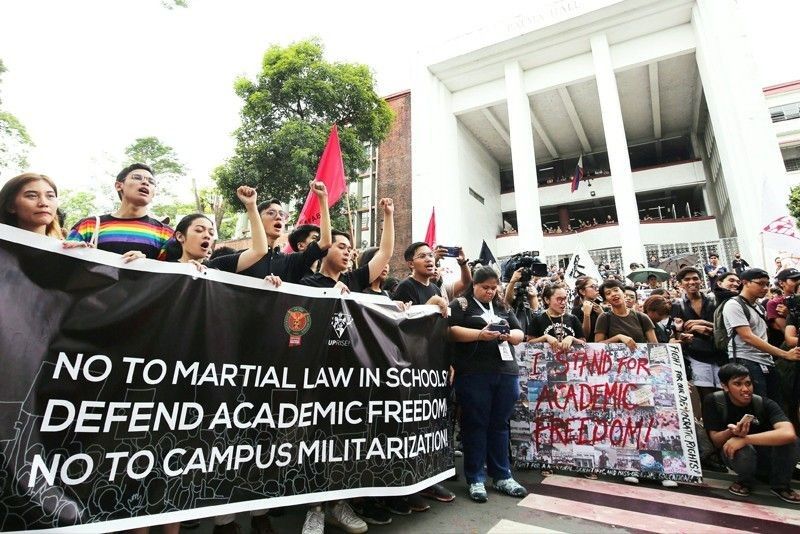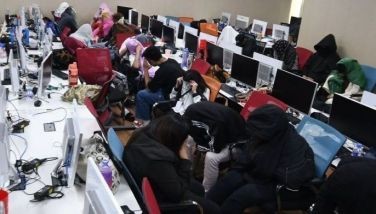UP president: 'Unwarranted' scrapping of UP-DND pact to sow 'more confusion, mistrust'

MANILA, Philippines — The decision of the defense department to end its decades-long accord with the University of the Philippines on the entry of state forces into campuses will only sow confusion and mistrust, and will have a chilling effect detrimental to academic freedom, the president of the national university said.
In a statement Tuesday, UP President Danilo Concepcion expressed the university’s grave concern over the unilateral termination of the UP-Department of National Defense accord, calling it “unnecessary and unwarranted, and may result in worsening rather than improving relations between our institutions.”
The deal, signed in 1989 between then UP President Jose Abueva and then defense chief Fidel Ramos, holds that military and police cannot enter any UP campus “except in cases of hot pursuit and similar occasions of emergency” or when assistance is requested by university officials.
Concepcion said the accord was abrogated unilaterally without prior consultation with the institution as he urged the DND to reconsider and revoke the termination.
“Instead of instilling confidence in our police and military, your decision can only sow more confusion and mistrust, given that you have not specified what it is that you exactly aim to do or put in place in lieu of the protections and courtesies afforded by the government,” he said.
Secretary Delfin Lorenzana, in a defense department press release, said UP "has become the breeding of intransigent individuals and groups whose extremist beliefs have inveigled students to join their ranks to fight against the government."
The defense chief also claimed that UP "has become a safe haven for enemies of the state."
In a statement, Vice President Leni Robredo said the move is designed to “sow fear, discourage dissent and silence criticism.”
“The unilateral scrapping of the decades-old accord sends the opposite message: That under this administration, anyone, anywhere, at anytime, is a fair game,” Robredo, a UP alumna, said.
‘Accord never stood in the way’
In a letter to Concepcion on January 15, Lorenzana terminated the agreement, citing unsubstantiated claims that the institution is recruiting members to the communist movement.
He said that the department “is aware that there is indeed an ongoing clandestine recruitment” inside UP campuses and the accord is being used to prevent government from holding operations.
But Concepcion pointed out that the deal “never stood in the way of police and security forces conducting lawful operations within our campuses.”
“Our University community does not and cannot fear the fair and speedy enforcement of the law, and we value and appreciate the contributions of our uniformed services to our safety and security.We do not condone sedition, armed insurrection, or the use of violence for political ends,” he said.
The development, publicized last night, signaled the Duterte’s government latest crackdown on dissent. Members of the UP community, the bastion of student activism, have long been linked to the communist movement or “red-tagged” which often resulted in critics and human rights defenders threatened or in some instances, killed.
There is nothing wrong with being an activist or a leftist after the country’s anti-subversion law was repealed in 1992.
Defend academic freedom
Youth groups called the move an attack on the democratic rights and academic freedom.
“Clearly, the regime and his military oppose the flourishing of progressive and critical education that strengthens the youth movement amid growing repression and tyranny of the government,” the League of Filipino Students said.
Before the UP-DND accord, the 1982 Soto-Enrile accord between former LFS national chair Sonia Soto and then Defense Minister Juan Ponce Enrile was signed to protect the autonomy of the university from military interventions, especially in protest rallies.
The UP president stressed that any form or semblance of militarization of campuses must be rejected at it will have a “chilling effect deleterious to academic freedom.”
“Our police and military authorities should have no fear of academic freedom. Indeed UP has bred rebels and nonconformists—as well as it has bred presidents, senators, congressmen, and business, civic, and even military leaders. All the world’s great universities have produced the same range of thinkers and doers,” Concepcion said.
“By and large, intellectual and political dissidents in UP have always been in the minority, but it is a critical minority that has historically been vital to the maintenance of a healthy democracy,” he added.
Anti-Terror Law
The scrapping of the UP-DND accord came after the newly-created Anti-Terrorism Council designated the Communist Party of the Philippines and its armed wing New People’s Army terrorist organizations.
The body was established under the highly-questioned Anti-Terrorism Law, which faces at least 37 legal challenges before the Supreme Court. Among the concerns raised against the law is the possible conflation of activism and dissent with terrorism and armed violence against the state.
Froilan Cariaga, chairperson of the UP Diliman Student Council, said in an interview on DZMM Teleradyo that the government’s termination of the agreement “paves the way for the implementation of the Anti-Terrorism Law.”
The Samahan ng Progresibong Kabataan said the move “completely exposes not only the paranoia of state forces but also the grossly-misplaced priorities” of the administration in the middle of the COVID-19 crisis.
An indignation rally is being held inside the UP Diliman campus Tuesday to protest the abrogation of the accord. — with a report from Christian Deiparine
- Latest
- Trending































